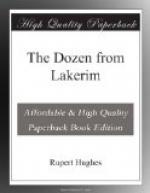It was a merry chase Tug led his weary crew: through one rough ravine where the hillside flowed out from under their feet and followed them down, and where they must climb the other side on slippery earth, grasping at a rock here and a root there; then through one little strip of forest that offered him an advantageous-short cut. Here again he silenced the protests of his men at the thick underbrush and the frequent brambles they encountered. Just at the edge of this little grove Tug put on an extra burst of speed, and was running like the wind. The others, following to the best of their ability, saw him about to pass between two harmless posts.
Suddenly they also saw him throw up his hands and fall over backward. When they reached him they saw that he had run into a barbed-wire fence in the dark.
XXIII
They were doubly dismayed now, because they not only had lost their leader, but were themselves lost in some part of the country where they knew neither the landmarks nor the points of the compass. They helped Tug cautiously to his feet, and, for lack of a better medicine, rubbed snow upon the ugly slashes in his breast and legs.
“This ends the race, as far as we are concerned,” moaned Bloss.
But Tug had recovered enough from his dizziness to shake his head and mane lion-like, and cry:
“Not much! Come on, boys!”
And before the restraining hand of Sawed-Off could stop him, Tug had somehow wormed himself through the barbed-wire fence and was off across the open; and they were sore put to it to catch up with him again.
Suddenly, as the devoted four followed their leader, the first station, the farm-house at which they were to report, loomed unexpectedly upon the horizon, approached in some unknown way by Tug, who was threading his way through the wilderness with more regard for straight lines than for progress. They were named off, as they flew past, by a watcher stationed there, and without pause they made off toward the railroad junction. Once they thought they saw a few fleeting forms in the distance, and they guessed that they must be Orton and his Brownsville team; but they could not feel sure, and no closer sight of their rivals was vouchsafed to them.
When the last station, the little red school-house, had been passed, they began to feel that there was some hope of their reaching home. They began also to feel the effect of their long, hard journey. Their sides hurt them sorely, their legs ached, and their breath came faster than they wished.
MacManus now showed more serious signs of weakening than any of the rest. He straggled along the way with feet that seemed to get into each other’s path, and with a head that wabbled uncertainly on his drooping shoulders.
Tug fell back and ran alongside him, trying to console and encourage him to better speed. MacManus responded to this plea with a spurt, and suddenly broke away from the four and ran wildly ahead with the speed of desperation.




